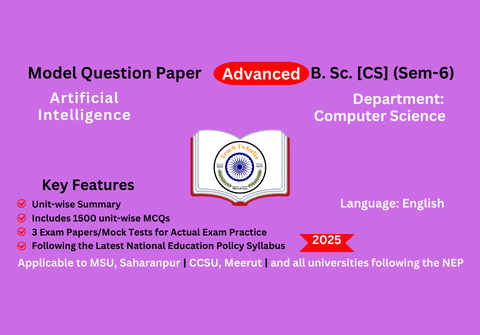Artificial Intelligence – Adv
- Description
- Curriculum
- Reviews

Model Question Paper
Artificial Intelligence
Key Features
- Unit-wise Short Notes
Each unit includes a summary in both languages, making revision faster and more effective. -
Extensive MCQ Practice
1500+ MCQ Practice Questions: This comprehensive question bank includes 1500+ multiple-choice questions (MCQs). Each unit contains approximately 150 MCQs covering a wide range of cognitive levels such as remembering, understanding, application, and analysi. -
Exam Practice Paper with Mock Tests
Includes three full-length mock tests for real exam practice. -
Latest Syllabus as per NEP
The syllabus aligns with the latest National Education Policy (NEP) and follows the exam patterns of MSU, CCSU, and other universities following the NEP. -
Designed by Experts
This question bank has been meticulously prepared by subject matter experts to ensure accuracy and relevance.
Why Choose This Model Paper?
- Complete Exam Preparation: Unit-wise summaries, MCQ practice, and mock tests provide a complete study solution.
-
Latest NEP-Based Pattern: Ensures compliance with the latest university exam structure.
|
Program/Class: Degree/ B.Sc |
Year: Third |
Semester: Sixth |
||
|
Subject: Computer Science |
||||
|
Course Title: Artificial Intelligence |
||||
|
Course Outcome: The main learning objectives of the course are to: Identify problems where artificial intelligence techniques are applicable. Apply selected basic AI techniques; judge applicability of more advanced techniques. |
||||
|
Credits: 4 |
Core Compulsory |
|||
|
Max. Marks: 25+75 |
Min. Passing Marks: 33 |
|||
|
Unit |
Topics |
|||
|
I |
Approaches to AI: Introduction and Applications, History of AI from Alan Turing and developments in AI, application areas, Criteria for success, Problem Characteristics, Problem representation- State space representation, problem reduction representation, production system, Introduction to agents, intelligent software systems
|
|||
|
II |
Search and Control Strategies: Data driven and goal driven search, Uninformed search- Breadth- first search and Depth- first Search methods, Heuristic Search Techniques- Hill Climbing, best first Search, A*, AO*, Constraint satisfaction and means- end analysis techniques.
|
|||
|
III |
Knowledge Representation: Information and Knowledge, Knowledge Acquisition and Manipulation, Issues in Knowledge Representation, Knowledge Representation methods, Propositional logic and First Order predicate Logic, Horn’s Clauses, Semantic Networks, Frames, scripts and Conceptual Dependencies.
|
|||
|
IV |
Game Playing: Min-max Search Procedure, Adding Alpha -Beta Cut-offs
|
|||
|
V |
Expert Systems: Definition and Applications, Characteristics of Expert Systems, Architecture of a typical Expert System, Expert System shells, Building an Expert System, Expert Systems like MYCIN, Specific Application of AI, Definition of Neurons, Communication and Learning in Neural Networks.
|
|||
-
1Unit 1: Summary - Artificial Intelligence
-
2Unit 1: MCQs - Artificial Intelligence- Adv
-
3Unit 2: Summary - Artificial Intelligence
-
4Unit 2: MCQs - Artificial Intelligence- Adv
-
5Unit 3: Summary - Artificial Intelligence
-
6Unit 3: MCQs - Artificial Intelligence- Adv
-
7Unit 4: Summary - Artificial Intelligence
-
8Unit 4: MCQs - Artificial Intelligence- Adv
-
9Unit 5: Summary - Artificial Intelligence
-
10Unit 5: MCQs - Artificial Intelligence- Adv







